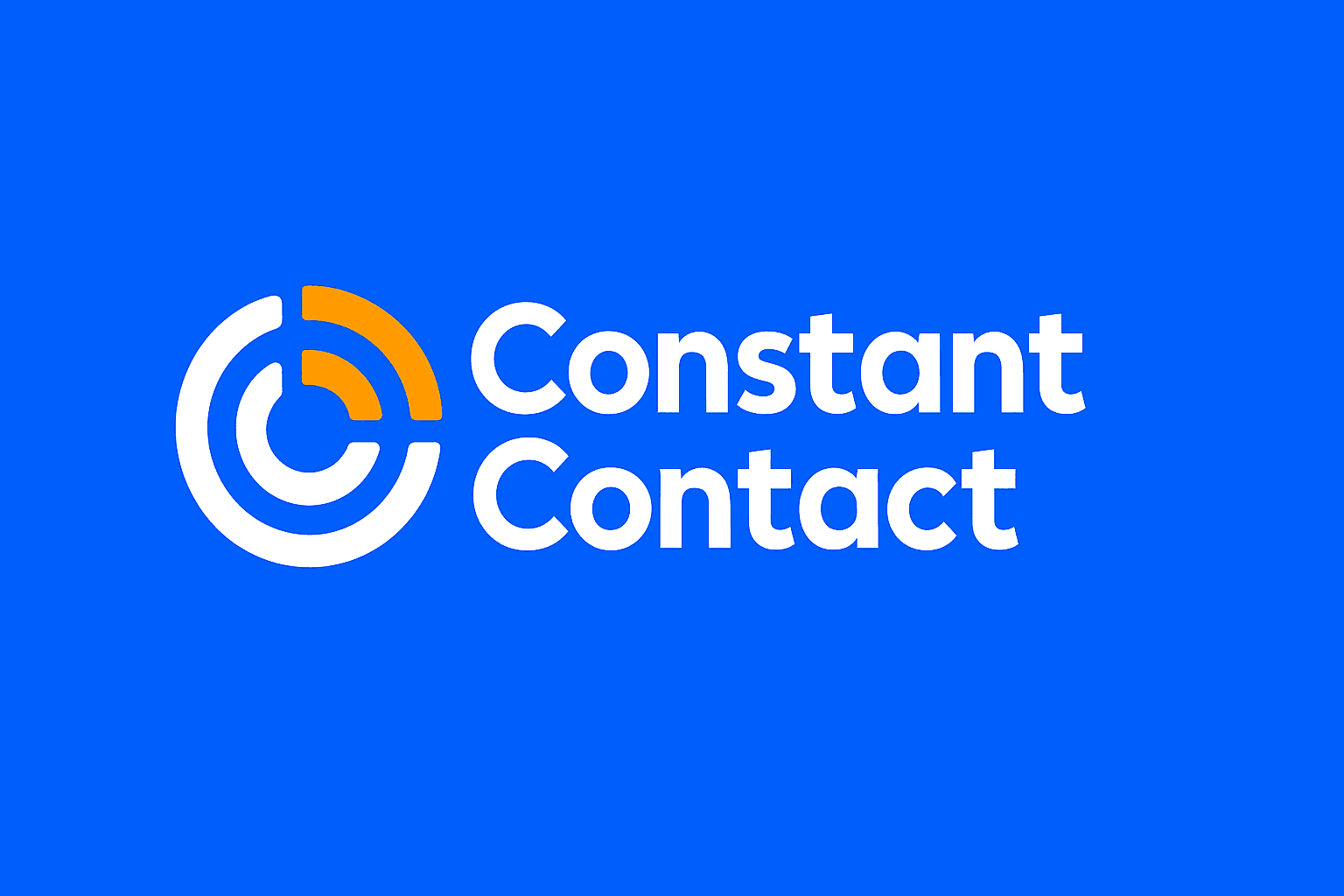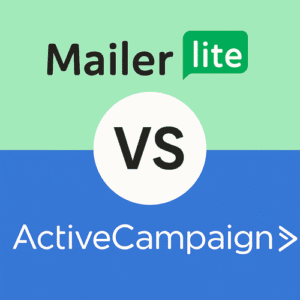Constant Contact is one of the most popular email marketing platforms for small businesses, nonprofits, and entrepreneurs looking to grow their audience and boost engagement. With its user-friendly interface, reliable deliverability, and a wide range of tools—from email automation to event marketing—Constant Contact has become a go-to solution for businesses of all sizes. In this blog post, we’ll dive deep into its features, pricing, pros and cons, and help you decide if it’s the right fit for your marketing needs.
Key Features of Constant Contact
Constant Contact offers a robust suite of tools designed to help businesses streamline their email marketing and grow their audience. Whether you’re a small business owner, a nonprofit, or a marketer, the platform provides a user-friendly experience backed by powerful features. Below are the key features that make Constant Contact stand out:
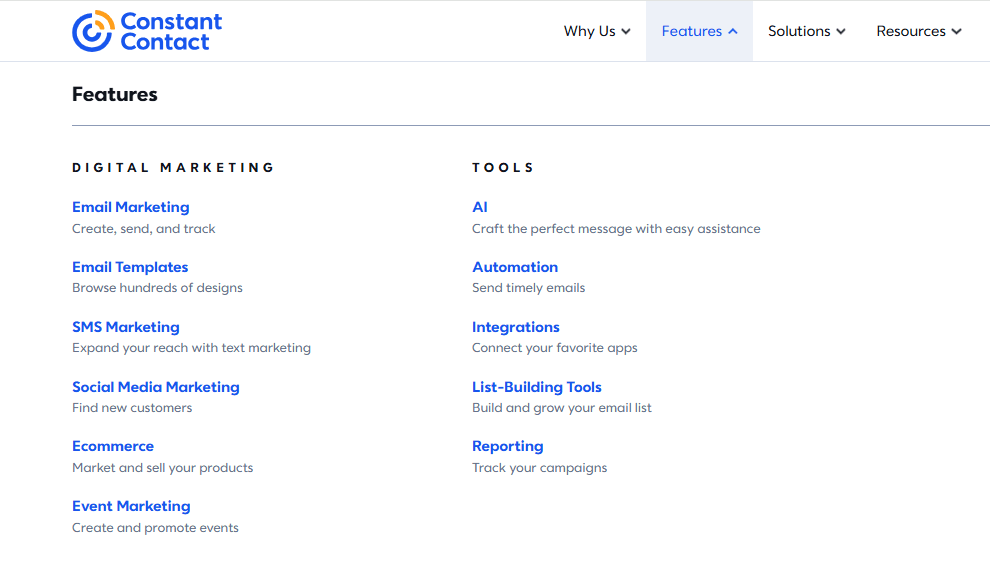
1. Drag-and-Drop Email Editor
Constant Contact includes an intuitive drag-and-drop email builder that lets you create professional-looking emails without any coding skills. You can customize templates, insert images, buttons, social links, and more.
2. Email Templates
The platform provides a wide range of pre-designed email templates tailored for various industries and occasions. These templates are mobile-responsive and easy to customize to match your brand.
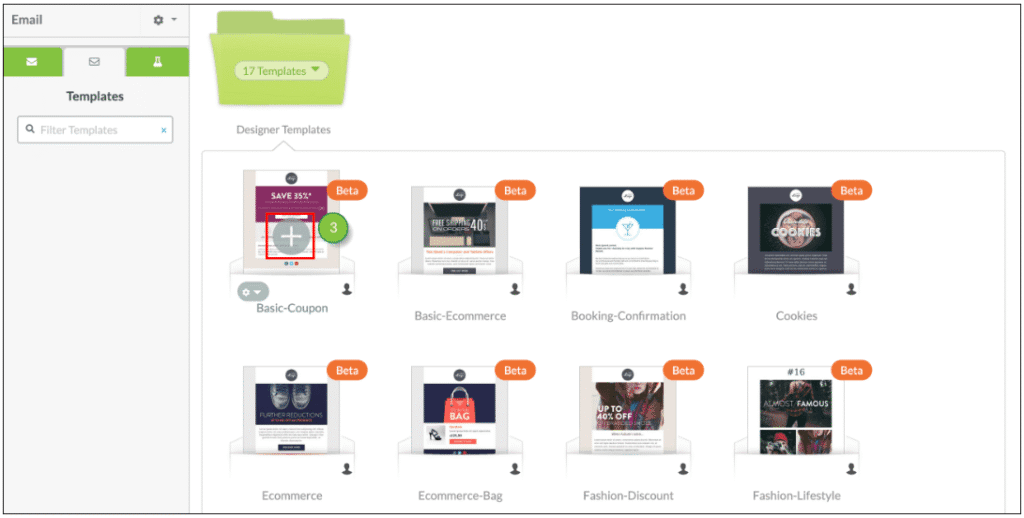
3. Marketing Automation
Constant Contact supports automation features like welcome emails, birthday messages, and email series triggered by subscriber behavior. These tools help keep your audience engaged while saving you time.
4. Contact List Management
With Constant Contact, managing your email lists is simple. You can import contacts, segment your audience based on behavior or demographics, and track engagement with ease.
5. Event Marketing Tools
One unique feature of Constant Contact is its built-in event marketing capabilities. You can create event invitations, manage RSVPs, and even sell tickets directly from the platform.
6. Social Media Tools
In addition to email marketing, Constant Contact offers tools to create and schedule posts on Facebook, Instagram, Twitter, and LinkedIn, making it easier to maintain consistent messaging across channels.
7. Real-Time Reporting
You can access detailed reports on open rates, click-through rates, bounces, and more. This helps you analyze your campaigns and make data-driven improvements.
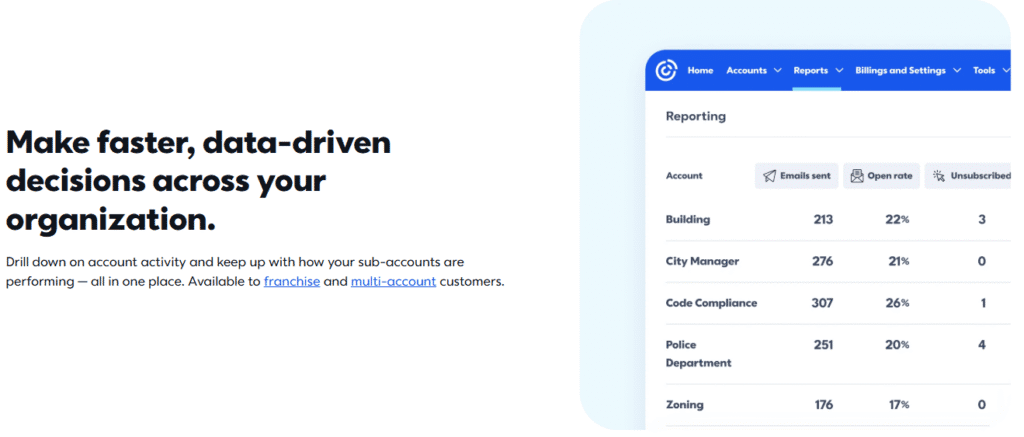
8. Integrations
Constant Contact integrates seamlessly with popular tools like Shopify, WordPress, QuickBooks, Salesforce, and more, helping you centralize your marketing efforts.
Ease of Use
One of the standout qualities of Constant Contact is its ease of use, making it a preferred choice for beginners and small businesses with limited technical skills. From signing up to launching your first campaign, the entire experience is designed to be smooth and intuitive.
1. User-Friendly Dashboard
Constant Contact features a clean, well-organized dashboard that allows users to easily navigate between campaigns, contacts, templates, and reports. Everything is labeled clearly, reducing the learning curve significantly.
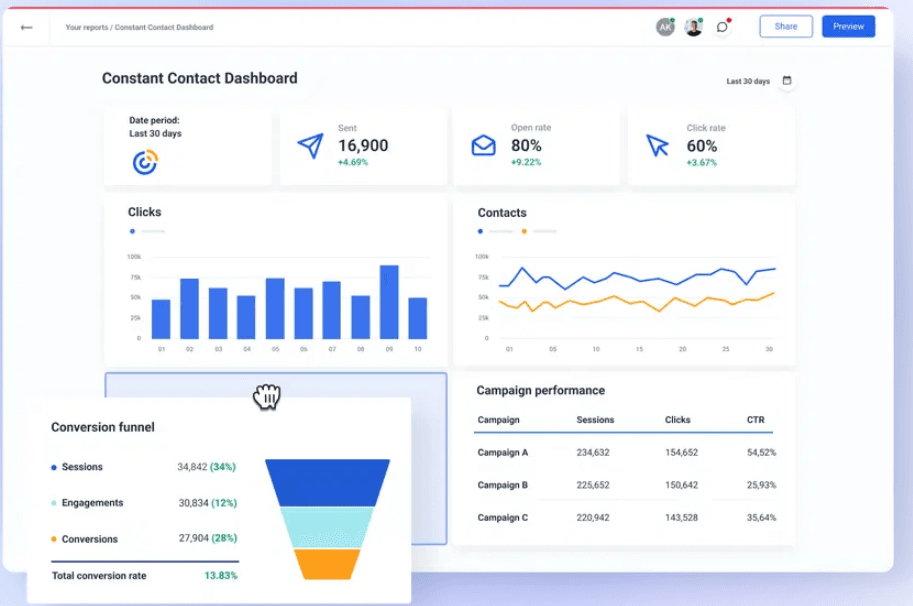
2. Drag-and-Drop Editor
The drag-and-drop email editor makes it simple to create attractive emails without touching a single line of code. You can drag text boxes, images, buttons, and social icons directly into your email layout.
3. Step-by-Step Setup Guides
Constant Contact provides helpful setup wizards and tooltips that guide users through creating their first email, setting up automation, or integrating other tools.
4. Mobile App Accessibility
With the Constant Contact mobile app, you can manage your email campaigns, view performance metrics, and even schedule social posts—all from your smartphone.
5. Helpful Onboarding and Tutorials
New users benefit from a guided onboarding process, a library of tutorials, and access to live chat or phone support. This makes it easy for anyone to get started and build confidence quickly.
Constant Contact scores high when it comes to user experience. Whether you’re a complete beginner or a seasoned marketer, the platform ensures that creating, sending, and tracking email campaigns is as straightforward as possible.
Email Marketing Tools
Constant Contact is best known for its powerful yet easy-to-use email marketing tools that help businesses build relationships, drive engagement, and grow their audience. Whether you’re launching a newsletter, promoting a sale, or sending automated messages, Constant Contact equips you with the right features to get results.
1. Customizable Email Templates
With hundreds of professionally designed templates, Constant Contact makes it easy to create emails that look great on any device. You can customize templates to match your brand by changing colors, fonts, images, and layout.
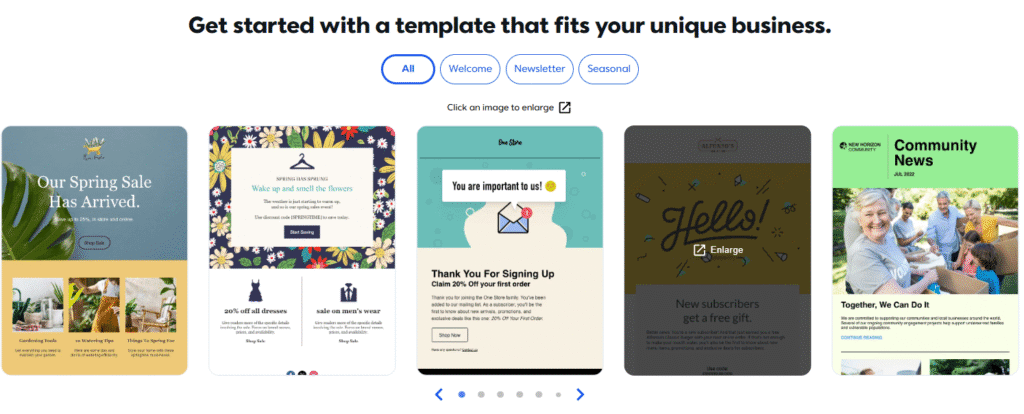
2. Personalization Options
You can add a personal touch to your emails using dynamic content such as the recipient’s name, location, or previous interactions. This boosts engagement and helps your emails feel more relevant.
3. A/B Testing
Constant Contact allows you to run A/B tests on subject lines to see which ones perform better. This helps you optimize your open rates and fine-tune your messaging strategy.
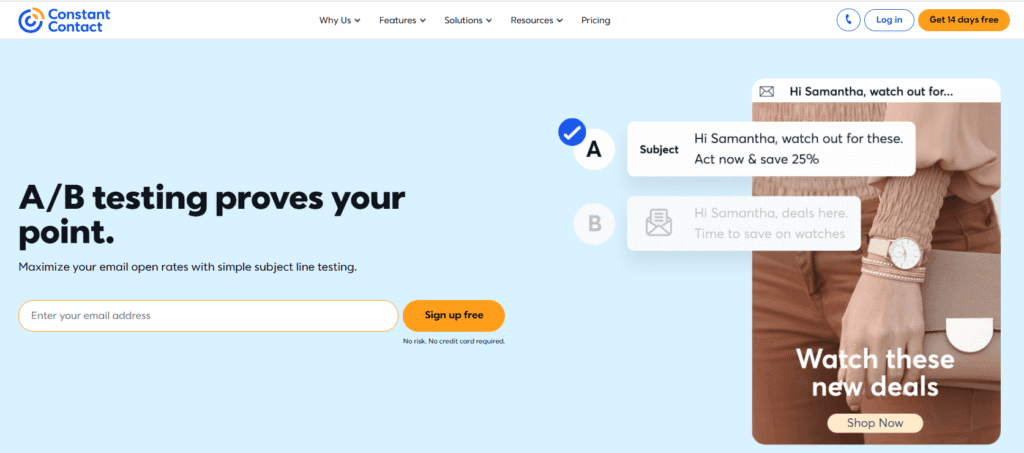
4. Autoresponders and Email Series
Automate your email campaigns by setting up autoresponders or drip campaigns. You can send welcome emails, follow-ups, or timed sequences based on subscriber behavior.
5. List Segmentation
Send targeted messages by segmenting your email list based on customer behavior, demographics, or engagement level. This ensures that the right message reaches the right audience.
6. Spam Checker and Preview Tool
Before sending, Constant Contact provides a preview tool and spam checker to ensure your emails are inbox-ready and look great across devices and email clients.
7. Surveys and Polls
Engage your audience directly through built-in survey and poll tools. You can collect feedback, measure satisfaction, or run promotions through interactive emails.
With these versatile email marketing tools, Constant Contact empowers businesses to create targeted, personalized, and professional email campaigns that convert. It’s a complete solution for anyone serious about email marketing success.
Templates and Design Options
One of the strongest advantages of Constant Contact is its wide selection of email templates and flexible design options. Whether you’re a beginner or an experienced marketer, the platform makes it easy to create beautiful, professional emails that match your brand and engage your audience.
1. Hundreds of Ready-Made Templates
Constant Contact offers a library of hundreds of pre-designed templates covering a wide range of industries and email types—from newsletters and event invites to product promotions and holiday messages. These templates are mobile-responsive and automatically adjust to fit any screen size.
2. Easy Customization
With the drag-and-drop editor, you can quickly modify templates by changing colors, fonts, images, text blocks, buttons, and layout. You don’t need coding skills to create emails that look polished and on-brand.
3. Branding Tools
Constant Contact helps maintain consistency with tools that let you upload your logo, save brand colors, and reuse design elements. There’s also a “BrandKit” feature that automatically creates template designs based on your website’s branding.
4. Responsive Design
All templates are built to be mobile-friendly. This ensures your emails look great whether your audience is opening them on a smartphone, tablet, or desktop.
5. Design Flexibility
In addition to using templates, Constant Contact allows users to build emails from scratch. This is useful for those who want total creative control or have specific layout needs.
The template and design features in Constant Contact are perfect for users who want to combine speed with design flexibility. Whether you’re sending a quick campaign or building a custom layout, the platform ensures your emails are visually appealing and on-brand every time.
Marketing Automation Capabilities
Constant Contact offers a range of marketing automation tools designed to save time, improve engagement, and deliver timely, personalized messages to your audience. Whether you’re nurturing leads or re-engaging inactive subscribers, automation helps keep your email marketing consistent and effective without constant manual effort.
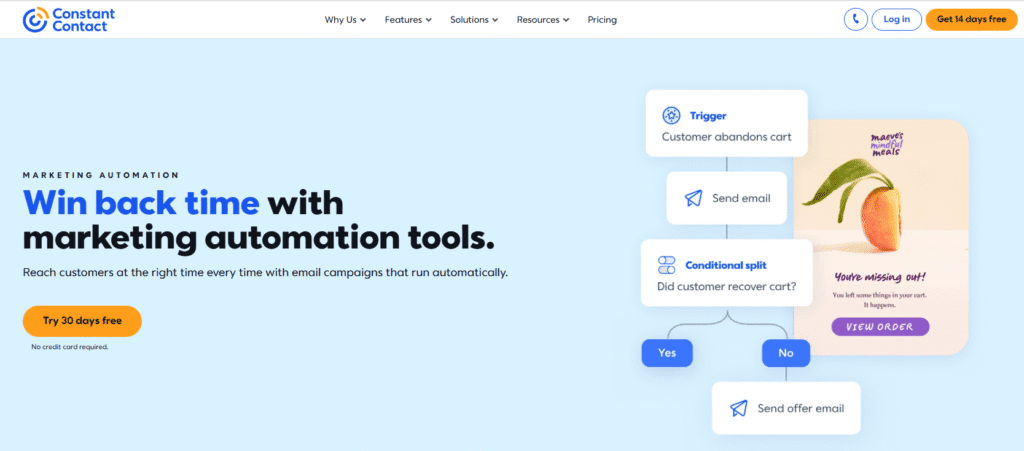
1. Welcome Email Series
With Constant Contact, you can automatically send a series of welcome emails to new subscribers. This is a great way to introduce your brand, share your story, and provide value from the first interaction.
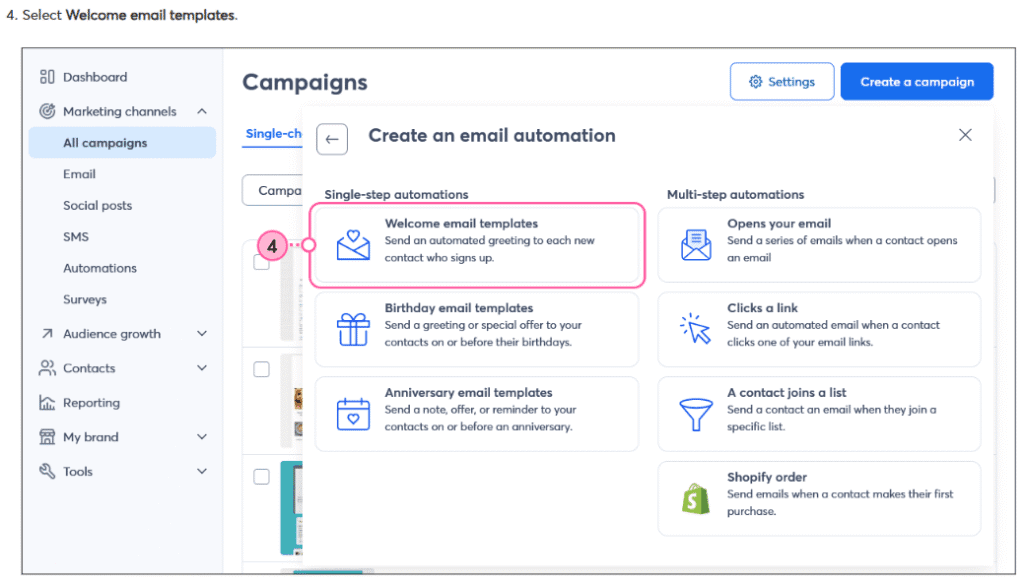
2. Triggered Email Campaigns
You can set up emails to send based on specific triggers—like a subscriber opening an email, clicking a link, or joining a particular list. This allows for highly targeted and timely communication.
3. Birthday and Anniversary Emails
Celebrate your customers by sending automated birthday or anniversary emails. These personal touches can increase engagement and brand loyalty.
4. Resend to Non-Openers
Constant Contact includes a feature that automatically resends your campaign with a different subject line to contacts who didn’t open the original email. This helps boost open rates and reach more of your audience.
5. Drip Campaigns
You can create multi-step email sequences—also known as drip campaigns—that deliver content over time. This is especially useful for onboarding, lead nurturing, and sales funnels.
6. Contact Segmentation for Automation
Automation can be combined with list segmentation so that specific subscriber groups receive personalized email sequences based on interests, behavior, or demographics.
Overall, the marketing automation capabilities in Constant Contact help users simplify their workflow while increasing the impact of their campaigns. Whether you’re sending a one-time email or building a full customer journey, automation ensures the right message reaches the right person at the right time.
Deliverability Rates
When it comes to email marketing, deliverability rates play a critical role in campaign success. A high deliverability rate means your emails are actually reaching your subscribers’ inboxes—rather than landing in the spam folder. Fortunately, Constant Contact is known for maintaining industry-leading deliverability rates, giving users confidence that their messages will be seen.
1. High Deliverability Standards
Constant Contact consistently achieves deliverability rates of over 97%, which is above average for the industry. This is made possible by their strong relationships with ISPs (Internet Service Providers) and continuous monitoring of sender reputations.
2. Built-In Spam Checks
Before sending your campaign, Constant Contact runs a spam check to identify potential red flags—like spammy keywords, improper formatting, or missing sender details. This helps reduce the chances of your emails being flagged by filters.
3. Authentication Tools
Constant Contact supports DKIM, SPF, and DMARC authentication, which helps verify your identity as a sender. This builds trust with email providers and improves inbox placement.
4. List Hygiene Tools
Clean contact lists are essential to deliverability. Constant Contact automatically removes invalid, bounced, or unsubscribed email addresses from your list to maintain sender reputation and avoid penalties.
5. Engagement Tracking
The platform provides detailed reports on open rates, click-through rates, bounces, and unsubscribes. Monitoring these metrics helps you adjust your strategy and improve future deliverability.
In summary, Constant Contact gives you the tools and infrastructure needed to maintain high deliverability rates, ensuring that your emails reliably land in your audience’s inbox. For marketers serious about results, this is a crucial factor when choosing an email marketing platform.
Integrations and Compatibility
One of the reasons businesses choose Constant Contact is its wide range of integrations and compatibility with popular tools and platforms. These integrations help streamline your marketing processes, centralize your data, and make your workflows more efficient—all without needing advanced tech skills.
1. E-commerce Integrations
Constant Contact connects seamlessly with major e-commerce platforms like Shopify, WooCommerce, BigCommerce, and Etsy. This allows you to sync your store data, track customer behavior, and send targeted product recommendation emails or abandoned cart reminders.
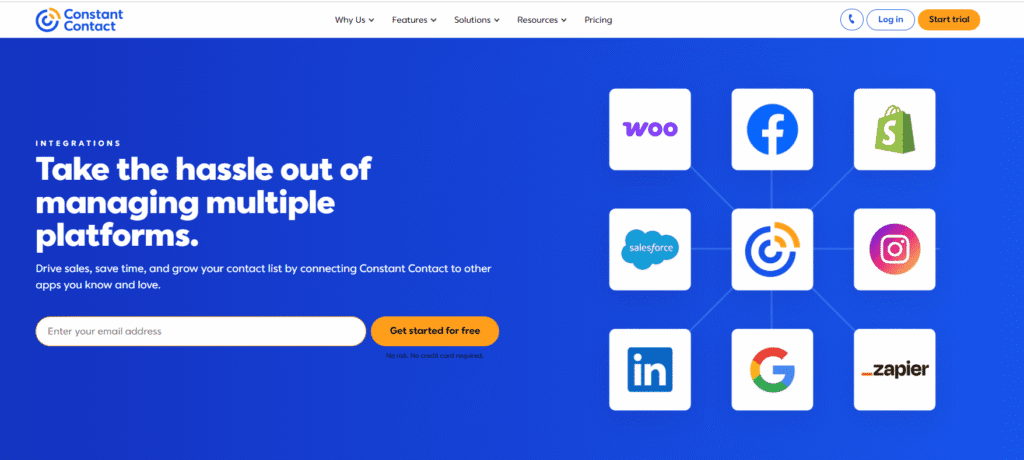
2. Website Builders
If you use website platforms like WordPress, Wix, Squarespace, or Weebly, you can easily embed Constant Contact sign-up forms and integrate with your site’s contact and newsletter systems.
3. CRM and Contact Management Tools
Constant Contact integrates with popular CRMs like Salesforce, Zoho CRM, and HubSpot, enabling you to sync contact lists and automate follow-ups based on customer data.
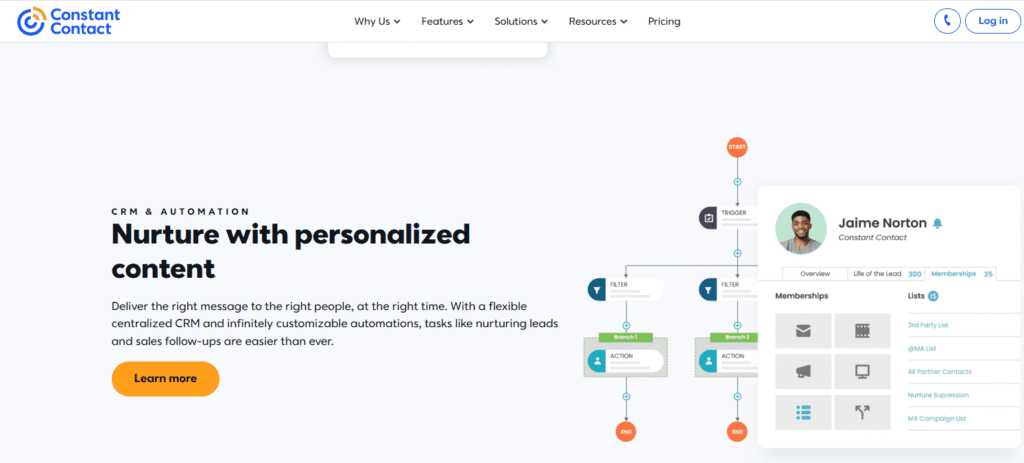
4. Social Media Platforms
You can connect your Constant Contact account with Facebook, Instagram, Twitter, and LinkedIn to manage and schedule posts, track social engagement, and even run ads directly from your dashboard.
5. Productivity and Event Tools
Integrations with apps like Eventbrite, SurveyMonkey, Google Sheets, and Zapier help you collect feedback, manage events, and automate data between apps—saving time and boosting efficiency.
6. API Access
For businesses with custom systems or developers on staff, Constant Contact provides a robust API that allows deeper customization and automation beyond built-in integrations.
With its wide compatibility and easy-to-set-up integrations, Constant Contact ensures that your marketing ecosystem works together smoothly. Whether you’re syncing contacts, automating campaigns, or tracking sales, these integrations help you do it all in one place.
CRM and Contact Management
Effective email marketing starts with organized contact data. Constant Contact includes built-in CRM and contact management features that help you manage your audience, personalize communication, and grow relationships with ease. Whether you have a few dozen subscribers or thousands, the platform makes it simple to keep your contacts in order.
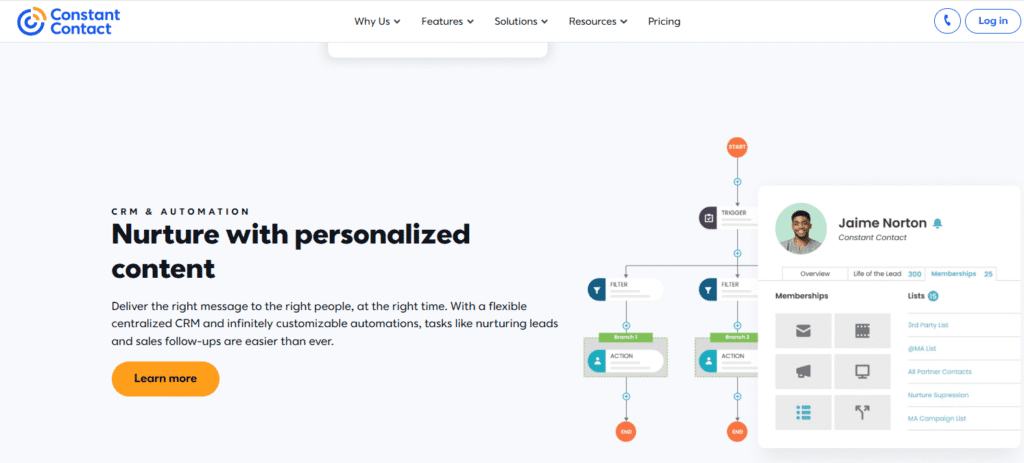
1. Easy Contact Import and Organization
You can import contacts into Constant Contact from spreadsheets, email clients, or third-party tools like Salesforce, Outlook, and QuickBooks. The platform automatically eliminates duplicates and detects formatting errors.
2. Custom Tags and Contact Fields
With Constant Contact, you can organize your contacts using tags and custom fields. This allows for more detailed segmentation and targeted email campaigns—for example, by purchase history, location, or lead source.
3. List Segmentation
Segmenting your audience is easy and intuitive. You can create lists based on engagement levels (e.g., active vs. inactive), interests, or behavior (e.g., clicked a link or opened a past email). This makes your messaging more relevant and effective.
4. Engagement History Tracking
Each contact profile in Constant Contact includes an engagement timeline showing which emails the subscriber opened, clicked, or ignored. This is incredibly helpful for understanding individual user behavior.
5. CRM Functionality for Relationship Building
While not a full-fledged CRM like Salesforce, Constant Contact offers essential tools to help you track customer relationships, manage communication history, and set up follow-ups. This makes it suitable for small businesses, nonprofits, and solopreneurs who want light CRM functionality within their email platform.
The CRM and contact management tools in Constant Contact give you more than just a place to store email addresses—they help you build smarter campaigns through better audience understanding. With organized contact data and actionable insights, you’re always one step closer to deeper engagement and stronger results.
Customer Support
When choosing an email marketing platform, reliable customer support can make a big difference—especially if you’re just getting started or run into technical issues. Constant Contact is well-regarded for its responsive and accessible customer support options, making it a dependable choice for users of all experience levels.
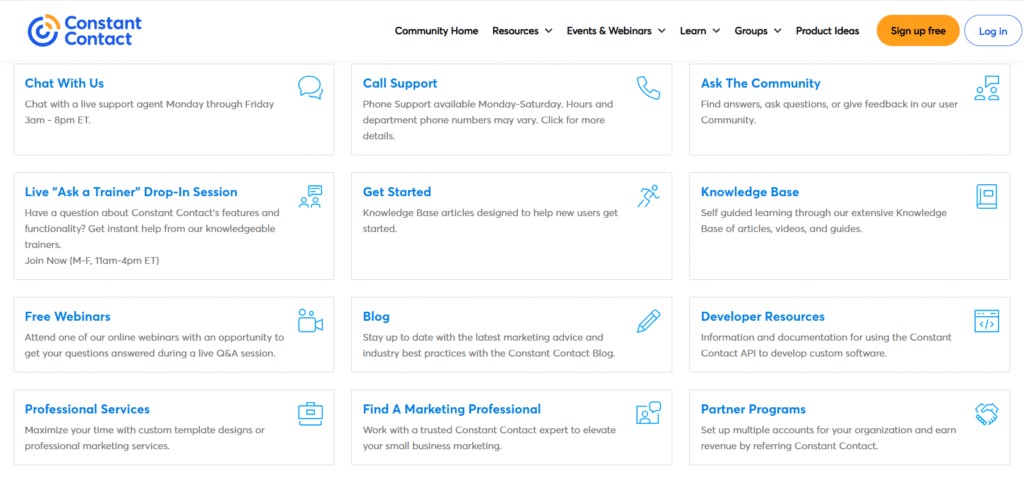
1. Live Chat and Phone Support
One of the standout features of Constant Contact’s support is the availability of live chat and phone assistance, which are available during business hours. This gives users quick access to real people who can help solve issues in real time.
2. Email Support
For less urgent issues or inquiries that require more detail, you can also reach Constant Contact’s support team via email. They typically respond within 24 hours.
3. Extensive Knowledge Base
Constant Contact maintains a robust Help Center filled with step-by-step guides, video tutorials, FAQs, and community forums. These resources cover everything from getting started to advanced automation techniques.
4. Free Webinars and Training
The platform regularly hosts live and on-demand webinars that teach users how to make the most of Constant Contact’s features. These sessions are especially helpful for small businesses and nonprofits looking to grow their marketing skills.
5. Community Forum Access
Users also benefit from an active community forum, where they can ask questions, share experiences, and get advice from other Constant Contact users and experts.
In summary, Constant Contact offers comprehensive customer support through multiple channels, ensuring that users are never left without help. Whether you prefer direct interaction or self-service learning, the platform provides the tools and resources to keep you moving forward.
Pricing & Plans
Understanding the pricing and plans of any email marketing service is crucial before making a commitment. Constant Contact offers flexible pricing based on the number of contacts in your email list, with features that scale depending on your needs. Whether you’re just starting out or managing a large contact database, there’s a plan to match your goals and budget.
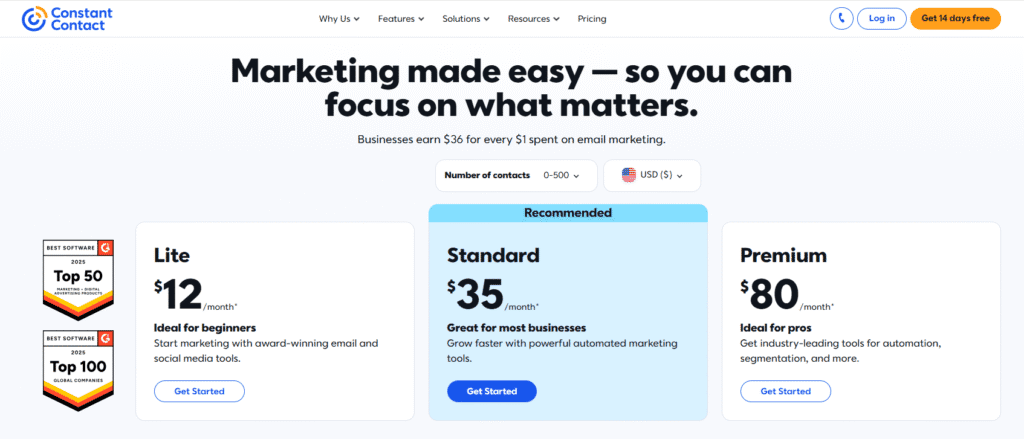
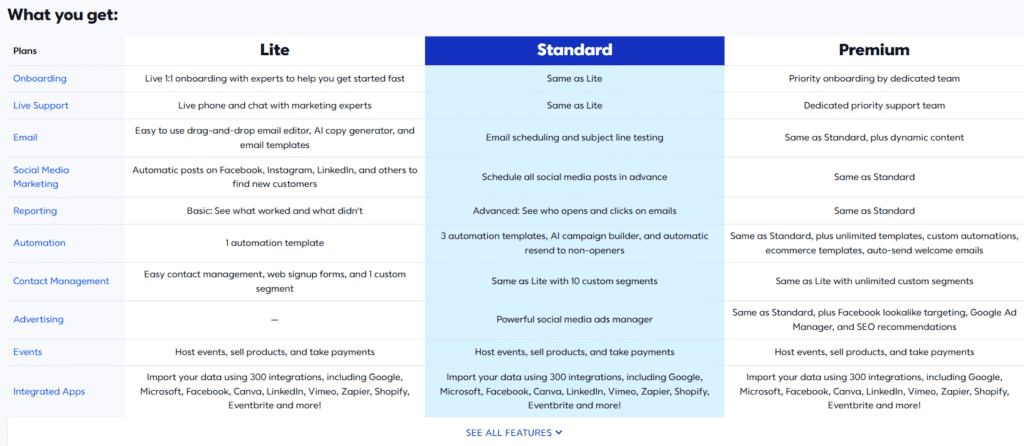
1. The Lite Plan
The Lite plan is the entry-level option designed for individuals and small businesses. It includes key features such as:
- Email marketing tools
- Hundreds of templates
- Real-time reporting
- Sign-up forms
- Basic automation (e.g., welcome emails)
Pricing: Starts at around $12/month for up to 500 contacts. Prices increase as your contact list grows.
2. The Standard Plan
The Plus plan is more advanced and ideal for growing businesses that want more automation and audience engagement tools. It includes everything in the Core plan, plus:
- Advanced email automation
- Polls and surveys
- Dynamic content
- Event marketing tools
- Behavioral targeting
- A/B testing
- Customizable pop-up forms
Pricing: Starts at approximately $35/month for up to 500 contacts.
3. Premium Plan
The Premium Plan is Constant Contact’s most comprehensive offering, designed for businesses seeking advanced marketing capabilities and extensive scalability.
💼 Premium Plan Overview
Ideal For: Large businesses, marketing agencies, and organizations requiring advanced automation, segmentation, and advertising tools
Starting Price: $80/month for up to 500 contacts.
Email Send Limit: Up to 12,000 emails per month for 500 contacts.
User Access: Unlimited users.
Storage: 25 GB of file storage.
SMS Marketing: Includes 500 free SMS messages per month.
4. Free Trial
Constant Contact offers a 14-day free trial (in select regions), which gives users full access to most features with no credit card required. This is a great way to test the platform before upgrading.
5. Add-ons and Extras
Depending on your business needs, you may also choose from optional paid add-ons like:
- SMS marketing
- Additional users
- Dedicated IP address (for high-volume senders)
Pros and Cons of Constant Contact
Like any marketing tool, Constant Contact has its strengths and limitations. Understanding both can help you decide whether it’s the right email marketing platform for your business. Below is a balanced look at the key pros and cons of Constant Contact based on real user experiences and feature analysis.
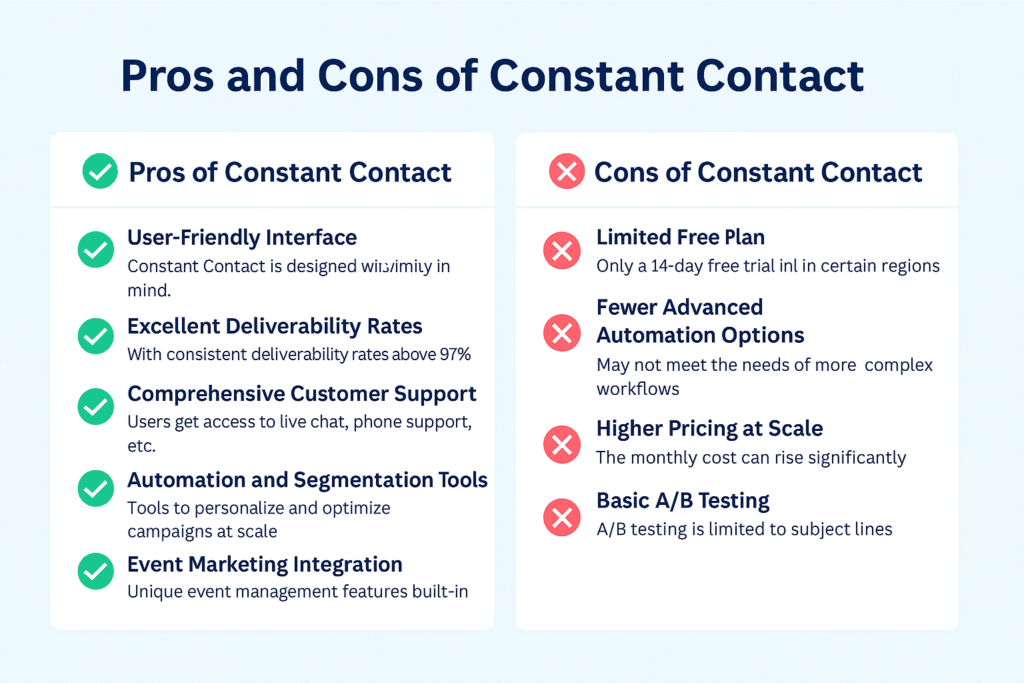
✅ Pros of Constant Contact
1. User-Friendly Interface
Constant Contact is designed with simplicity in mind. Its clean dashboard and drag-and-drop email editor make it easy for beginners to create professional campaigns without coding.
2. Excellent Deliverability Rates
With consistent deliverability rates above 97%, your emails are more likely to reach inboxes, which is essential for campaign success.
3. Comprehensive Customer Support
Users get access to live chat, phone support, a rich knowledge base, and community forums. This makes it easy to find answers or get help when needed.
4. Automation and Segmentation Tools
From automated welcome series to contact segmentation, Constant Contact gives you the tools to personalize and optimize your campaigns at scale.
5. Event Marketing Integration
Unique to Constant Contact, the built-in event management features allow you to create and promote events, track RSVPs, and even sell tickets—all from one platform.
6. Integration with Popular Platforms
Constant Contact integrates seamlessly with WordPress, Shopify, Facebook, Salesforce, and many other tools to support a connected marketing workflow.
❌ Cons of Constant Contact
1. Limited Free Plan
Unlike some competitors, Constant Contact does not offer a completely free forever plan—only a 14-day free trial in certain regions.
2. Fewer Advanced Automation Options
While it includes essential automation features, Constant Contact may not meet the needs of marketers looking for more complex or conditional workflows.
3. Higher Pricing at Scale
As your contact list grows, the monthly cost can rise significantly—especially compared to competitors with more generous contact limits in their lower-tier plans.
4. Basic A/B Testing
A/B testing is only available in the Plus plan, and even then, it’s currently limited to subject line testing.
Overall, Constant Contact is a solid choice for small to mid-sized businesses seeking an easy-to-use platform with reliable deliverability and strong customer support. However, for those who need deep automation or tighter budgets, it’s important to weigh the pros against the cons.
Is Constant Contact Worth It?
Constant Contact offers great value for users who prioritize ease of use, strong support, and reliable performance. If you’re looking for a dependable, user-friendly email marketing platform, Constant Contact is definitely worth considering. With its intuitive interface, strong deliverability rates, and extensive customer support, the platform is well-suited for small to medium-sized businesses, nonprofits, and entrepreneurs who want to grow their email lists and engage their audiences effectively.
In conclusion, Constant Contact is worth it for most users seeking a solid email marketing foundation. It strikes the right balance between simplicity and functionality, making it a trusted choice for thousands of marketers worldwide.
Read more on MailerLite Vs ActiveCampaign 2025-Which is the Best Email Marketing Tool?
👉 Try The Best Email Marketing Tool


